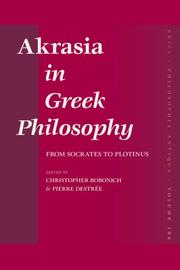| Listing 1 - 5 of 5 |
Sort by
|

ISBN: 0199251436 0191597082 019927410X 9786611930479 1281930474 0191530735 9780199274109 9780199251438 Year: 2002 Publisher: Oxford Clarendon Press
Abstract | Keywords | Export | Availability | Bookmark
 Loading...
Loading...Choose an application
- Reference Manager
- EndNote
- RefWorks (Direct export to RefWorks)
Political philosophy. Social philosophy --- General ethics --- Plato --- Ethics, Ancient --- Political ethics --- Political science --- Morale ancienne --- Morale politique --- Science politique --- History --- Philosophy --- Histoire --- Philosophie --- Plato. --- Ethics --- Political and social views --- -Plato --- -Aflāṭūn --- Aplaton --- Bolatu --- Platon, --- Platonas --- Platone --- Po-la-tʻu --- Pʻŭllatʻo --- Pʻŭllatʻon --- Pʻuratʻon --- Πλάτων --- אפלטון --- פלאטא --- פלאטאן --- פלאטו --- أفلاطون --- 柏拉圖 --- 플라톤 --- Contributions in political science --- -Ethics --- Aflāṭūn --- Ethics. --- Political and social views. --- Platon --- Platoon --- History. --- Платон --- プラトン --- Contributions in political science. --- Ethics, Ancient. --- Ethik. --- Political science. --- Politische Philosophie. --- Plato, --- Laws (Plato). --- Phaedo (Plato). --- Republic (Plato). --- Plato - Ethics --- Plato - Political and social views --- Plato - Phaedo --- Plato - Republic --- Plato - Laws
Book
ISBN: 9781107652316 9781107053915 1107652316 1107053919 9781107284258 Year: 2017 Publisher: Cambridge Cambridge University Press
Abstract | Keywords | Export | Availability | Bookmark
 Loading...
Loading...Choose an application
- Reference Manager
- EndNote
- RefWorks (Direct export to RefWorks)
The field of ancient Greek ethics is increasingly emerging as a major branch of philosophical enquiry, and students and scholars of ancient philosophy will find this Companion to be a rich and invaluable guide to the themes and movements which characterised the discipline from the Pre-Socratics to the Neo-Platonists. Several chapters are dedicated to the central figures of Plato and Aristotle, and others explore the ethical thought of the Stoics, the Epicureans, the Skeptics, and Plotinus. Further chapters examine important themes that cut across these schools, including virtue and happiness, friendship, elitism, impartiality, and the relationship between ancient eudaimonism and modern morality. Written by leading scholars and drawing on cutting-edge research to illuminate the questions of ancient ethics, the book will provide students and specialists with an indispensable critical overview of the full range of ancient Greek ethics.
History of philosophy --- General ethics --- Ethics, Ancient. --- Ethics --- Ethics. --- Greece. --- Philosophie --- Ethik --- Antike --- Blacks --- Citizenship. --- French colonies. --- Political activists. --- Politics and government. --- Citizenship --- Political activists --- History. --- Griechenland --- Africa. --- Africa, West. --- America. --- Lesser Antilles --- Africa, West --- France --- West Indies, French --- Afrique occidentale --- Antilles françaises --- Colonies --- Politique et gouvernement --- Éthique des vertus. --- Morale. --- Eudémonisme. --- Platon --- Aristote --- Antilles françaises --- Ethics, Ancient --- Éthique des vertus --- Greece --- Ethics - Greece
Book
ISBN: 9781107658684 9780521884631 0521884632 9780511781483 1107658683 9780511919121 0511919123 0511851286 1107219132 1282918559 9786612918551 0511918143 0511917163 0511915357 0511781482 0511913567 6612918551 Year: 2010 Publisher: Cambridge Cambridge university press
Abstract | Keywords | Export | Availability | Bookmark
 Loading...
Loading...Choose an application
- Reference Manager
- EndNote
- RefWorks (Direct export to RefWorks)
"Long understudied, Plato's Laws has been the object of renewed attention in the past decade, and is now considered to be his major work of political philosophy besides the Republic. In his last dialogue, Plato returns to the project of describing the foundation of a just city and sketches in considerable detail its constitution, laws and other social institutions. Written by leading Platonists, these essays cover a wide range of topics central for understanding the Laws, such as the aim of the Laws as a whole, the ethical psychology of the Laws, especially its views of pleasure and non-rational motivations, and whether and, if so, how the strict law code of the Laws can encourage genuine virtue. They make an important contribution to ongoing debates and will open up fresh lines of inquiry for further research"--Provided by publisher.
Plato --- Vertu --- Platon, --- State, The. --- Plato. --- State, The --- Administration --- Commonwealth, The --- Sovereignty --- Political science --- Etat --- Vertus. --- Laws (Plato). --- État. --- Platon. --- Platon --- Arts and Humanities --- Philosophy

ISSN: 00791687 ISBN: 9004156704 9789004156708 9786612396960 128239696X 9047420128 9789047420125 Year: 2007 Volume: 106 Publisher: Leiden Brill
Abstract | Keywords | Export | Availability | Bookmark
 Loading...
Loading...Choose an application
- Reference Manager
- EndNote
- RefWorks (Direct export to RefWorks)
Discussions on akrasia (lack of control, or weakness of will) in Greek philosophy have been particularily vivid and intense for the past two decades. Standard stories that presented Socrates as the philosopher who simply denied the phenomenon, and Plato and Aristotle as rehabilitating it straightforwardly against Socrates, have been challenged in many different ways. Building on those challenges, this collective provides new, and in some cases opposed ways of reading well-known as well as more neglected texts. Its 13 contributions, written by experts in the field, cover the whole history of Greek ethics, from Socrates to Plotinus, through Plato, Aristotle, and the Stoics (Cleanthes, Chrysippus, Epictetus).
Akrasia --- Philosophy, Ancient. --- History. --- Akrasia. --- Ethics --- Wilszwakte. --- History --- Ethics, Ancient. --- Morale ancienne --- Histoire --- Philosophy, Ancient --- Ancient philosophy --- Greek philosophy --- Philosophy, Greek --- Philosophy, Roman --- Roman philosophy --- Ethics, Greek --- Acrasia (Ethics) --- Incontinence (Ethics) --- Akrasia - Greece - History.
Book
ISBN: 1108505813 1108514758 1107284252 Year: 2017 Publisher: Cambridge : Cambridge University Press,
Abstract | Keywords | Export | Availability | Bookmark
 Loading...
Loading...Choose an application
- Reference Manager
- EndNote
- RefWorks (Direct export to RefWorks)
The field of ancient Greek ethics is increasingly emerging as a major branch of philosophical enquiry, and students and scholars of ancient philosophy will find this Companion to be a rich and invaluable guide to the themes and movements which characterised the discipline from the Pre-Socratics to the Neo-Platonists. Several chapters are dedicated to the central figures of Plato and Aristotle, and others explore the ethical thought of the Stoics, the Epicureans, the Skeptics, and Plotinus. Further chapters examine important themes that cut across these schools, including virtue and happiness, friendship, elitism, impartiality, and the relationship between ancient eudaimonism and modern morality. Written by leading scholars and drawing on cutting-edge research to illuminate the questions of ancient ethics, the book will provide students and specialists with an indispensable critical overview of the full range of ancient Greek ethics.
| Listing 1 - 5 of 5 |
Sort by
|

 Search
Search Feedback
Feedback About UniCat
About UniCat  Help
Help News
News